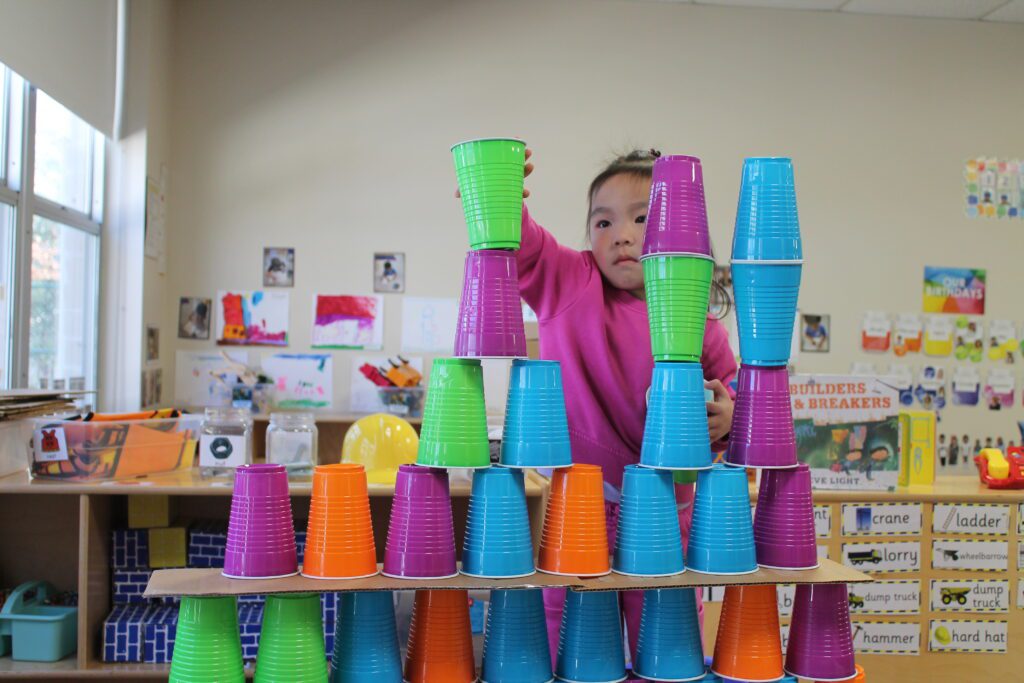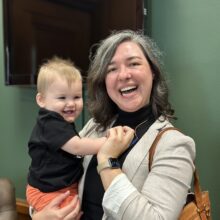Early care and learning in our neighborhoods
Early Bird readers, hello again. Newcomers, welcome! If you were forwarded this email, you can sign up here to receive it every two weeks, and join our conversation on issues facing North Carolina’s young children and those who support them. If you’re already a subscriber, please help us reach more people by sharing this with your friends and co-workers interested in early childhood education.

While legislators were busy cranking out a slew of child care bills (see the Legislative Updates section below), Liz and I have been bopping around the state. Liz was in the mountains, attending the WNC Health Policy Initiative Legislative Summit on Child Care at UNC-Asheville, and I was on the coast, attending the Albemarle Alliance for Children and Families first annual Child Care Solutions Summit at College of the Albemarle.
With all of the traveling we do, it would be easy to overlook the wonderful work that folks are doing right here in Raleigh. No, I’m not talking about legislators in this case — I’m talking about early childhood educators, like those at Frankie Lemmon School & Developmental Center.
This wonderful school has been supporting young children with disabilities and their families for 60 years, just across town from where I’ve lived for more than two decades. Visiting these neighbors recently was a reminder that child care and early education is always happening just around the corner in all of our neighborhoods, whether that’s at a public school, a child care center, or in the home of a trusted educator, friend, family, or neighbor.
There are so many of you — educators, families, researchers, advocates — with a stake in North Carolina’s early care and learning landscape. And it’s an honor and joy to help you share your stories.
A new way we’re doing that is through our Profiles in Care series. These profiles will highlight your personal experiences, and how policy decisions at all levels affect you and the young children in your lives. Check out our first Profile in Care and stay tuned for more to come!
And take a few minutes to learn what happened at the first meeting of Gov. Stein’s child care task force, why health providers say child care is the key to health after Helene, and how to host a community screening of “Take Care,” a documentary produced by DHHS that just happens to feature EdNC’s very own Liz Bell!
More from EdNC on early childhood
Profiles in Care | Marsha Hargette and the Frankie Lemmon School
EdNC is highlighting the experiences of educators, families, researchers, and advocates with a stake in North Carolina’s early care and...Here are the child care bills proposed for the 2025 legislative session
Legislators have filed several bills this session that would shape children’s early learning experiences, including more than 30 bills aimed...Child care solutions from the first meeting of Gov. Stein's task force
Members of Gov. Josh Stein’s Task Force For Child Care and Early Education were sworn in Monday before hearing from...‘Take Care’ screenings pop up across North Carolina. Here’s how to host one
A documentary produced by the state Department of Health and Human Services (DHHS) focused on solving North Carolina’s child care...Child care is key to health care after Helene, regional health providers say
Health care employers in Western North Carolina joined the multiple sectors calling for child care solutions at a legislative summit...Perspective | Early childhood education is everyone’s business
Our three organizations — Greater Winston-Salem Inc, REACH Women’s Network, and Leadership Winston-Salem — work intentionally in Forsyth County to...The big picture for little kids
Legislative Updates
Liz here! More than 30 bills have been filed aimed at addressing child care challenges — access, affordability, and quality. You can read our full breakdown on the bills here, but here’s a quick introduction to some of the bills to watch.
- The House on Wednesday passed House Bill 389, which would create a pilot to provide free training to individuals interested in working in child care in 10 communities across the state.
- Senate Bill 412 would allocate $123.5 million in recurring funding to increase the amount child care programs receive to serve children through the subsidy program.
- House Bill 412, passed by the House Health committee Tuesday, includes several regulatory reforms that would impact how child care facilities operate, like making five years of experience count as a lead teacher credential and expanding maximum class sizes. It also directs the state Division of Child Development and Early Education (DCDEE) to create a plan to decouple subsidy funding from programs’ quality ratings, among other measures.
- House Bill 542 would send $7.5 million each year to the North Carolina Partnership for Children for mental and behavioral health services for children, educators, and families in child care settings.
- House Bill 800 would allocate $10 million to create a pilot to help child care teachers afford child care for their own children. It has many other components — too much to capture in a newsletter bullet point — so we encourage y’all to read the more detailed breakdown.
- House Bill 877 would create a pilot for a public-private partnership to build a child care facility using publicly owned land and buildings to cut down on the costs of building a new facility.
- House Bill 309 would establish a classification for family child care homes in the state building code. This would alleviate some of the barriers providers face in navigating local ordinances, as well as costs associated with a commercial building classification, said Courtney Alexander, who works with home-based providers at the nonprofit MDC.
News & Research
-
Child Care Support Services Are an Overlooked Strategy for Re-Enrolling Adult Learners - From New America
-
What Will Districts Do With All Those Empty School Buildings? Some Look to Fill Them With Younger Kids - From EdSurge
-
Families and Providers Deserve More Notice When Child Care Programs Close - From The 74: Early Learning Nation
-
Early Childhood Education in the Fifth District: The Challenges and the Opportunities - From Federal Reserve Bank of Richmond
-
Preschool Isn't Prep—It's Prime Time for Brain Growth - From Psychology Today
-
‘Chainsaw Approach’ to Budget Cuts Leaves Military Families as Collateral Damage - From The 74: Early Learning Nation
Taking flight! Opportunities to spread your wings
-
Meeting the Moment: Early Childhood and Homelessness - From The Saul Zaentz Charitable Foundation
Date & Time = Apr 17, 2025 — 12:00 PMFrom the organizers: An estimated 1 in every 30 American children experiences homelessness each year — a figure larger than the total number of children in 28 states. Join The Saul Zaentz Foundation on April 17 for the first installment of the Meeting the Moment Webinar Series, which will explore homelessness’ impact on the nation’s youngest learners, uplift promising policy solutions, and introduce viewers to program leaders working to meet the direct needs of homeless children. -
Intro to Trauma & Resilience continuing education course - From Stanly Community College
Date & Time = April 29, May 20, and June 17 — 5:30-7:30 PM
Three hybrid+ class sessions (recorded for students unable to attend live, either in person or virtually); 20 hours / 2.0 CEUs
Intro to Trauma and Resilience is for teachers working with children from infancy through adolescence. It is important to learn about different terms related to trauma and resilience, the impact of trauma on the body, brain, and relationships, strategies for supporting children as well as preparing yourself to work with children who may have experienced trauma. This course is designed to support teachers in childcare facilities (homes, centers, and afterschool programs) and public or private school teachers.
-
2025 International Early Childhood Inclusion Institute Hybrid Conference - From UNC Frank Porter Graham Child Development Institute
Date = May 13-15, 2025
From the organizers: We welcome early childhood and early childhood special education (EC/ECSE) professionals, families, individuals with disabilities, EC/ECSE higher education faculty, professional development and technical assistance providers, local, state, or national administrators and leaders, as well as EC and ECSE students. Whether you are a family of a child with disabilities, a newcomer in the field of early childhood/early childhood special education or a seasoned professional, you’ll be able to find topics that matter the most to you in serving children with disabilities and families in inclusive environments from over 50 sessions. We hope that the Inclusion Institute will leave you feeling informed, energized, and supported.
Attendees may register for in-person or virtual event.



